Psychological Challenges Faced by International Students in Australia
VerifiedAdded on 2023/01/17
|5
|1148
|48
Essay
AI Summary
This essay examines the psychological difficulties encountered by international students at Australian universities, focusing on issues like anxiety, depression, addiction, and cultural adjustment. It highlights the prevalence of loneliness, homesickness, discrimination, and academic stress among these students. The essay also proposes solutions such as counseling services, monitoring for substance abuse, and establishing support teams to address the unique needs of international students, including cultural and linguistic challenges. It emphasizes the importance of addressing harassment and discrimination to foster a more supportive and inclusive environment, ultimately improving the mental well-being and academic performance of international students. Desklib provides access to a wide range of solved assignments and past papers for students.
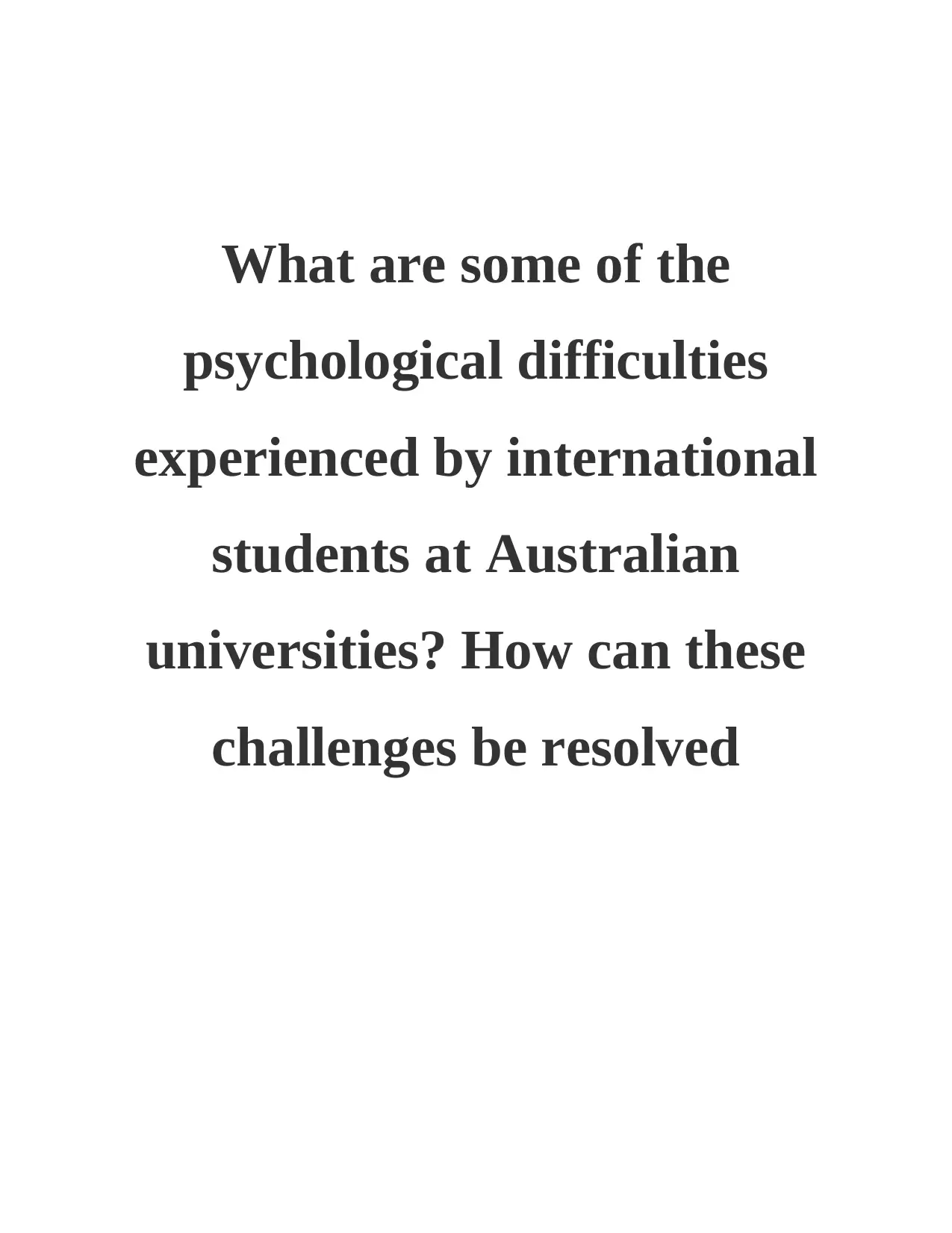
What are some of the
psychological difficulties
experienced by international
students at Australian
universities? How can these
challenges be resolved
psychological difficulties
experienced by international
students at Australian
universities? How can these
challenges be resolved
Paraphrase This Document
Need a fresh take? Get an instant paraphrase of this document with our AI Paraphraser
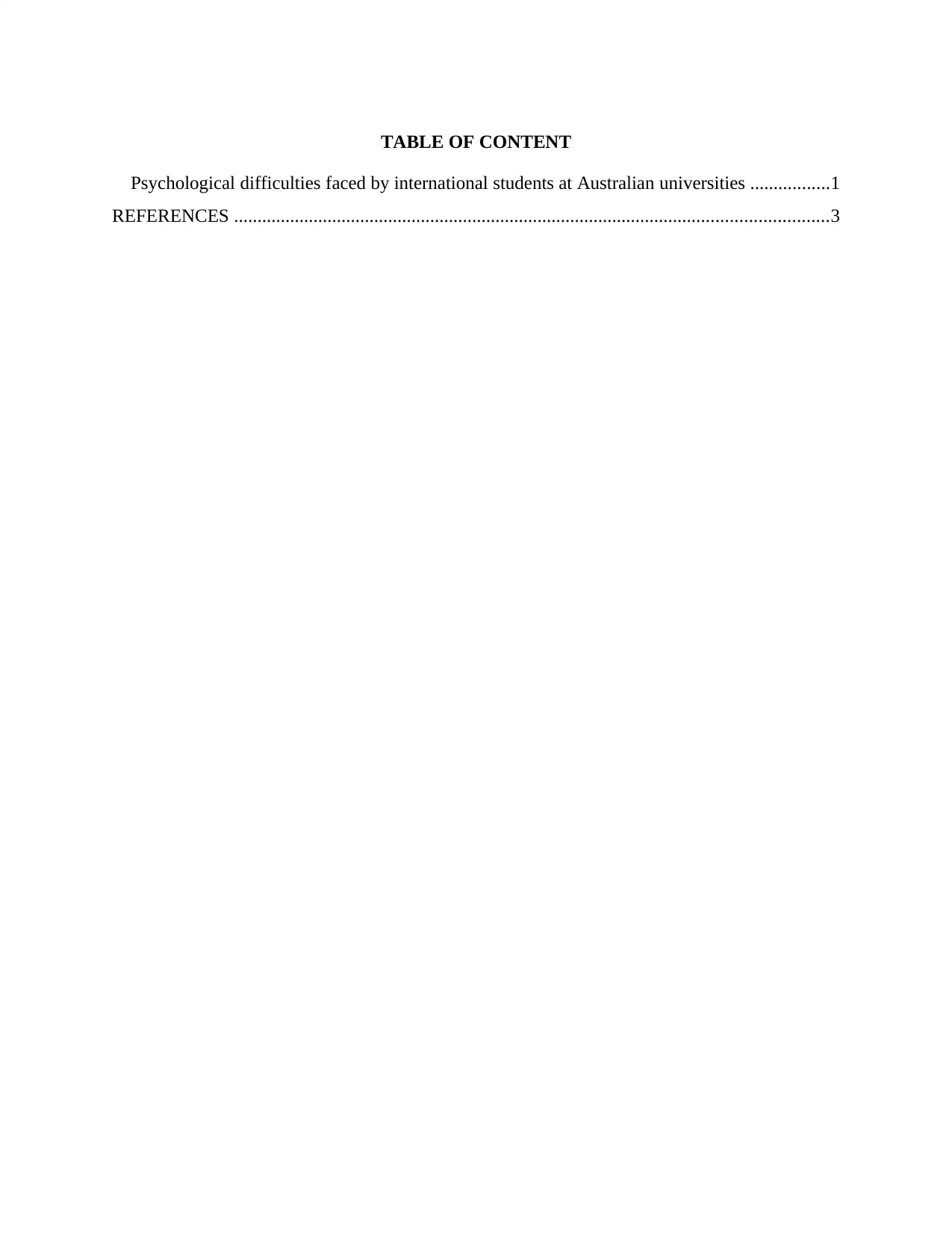
TABLE OF CONTENT
Psychological difficulties faced by international students at Australian universities .................1
REFERENCES ...............................................................................................................................3
Psychological difficulties faced by international students at Australian universities .................1
REFERENCES ...............................................................................................................................3
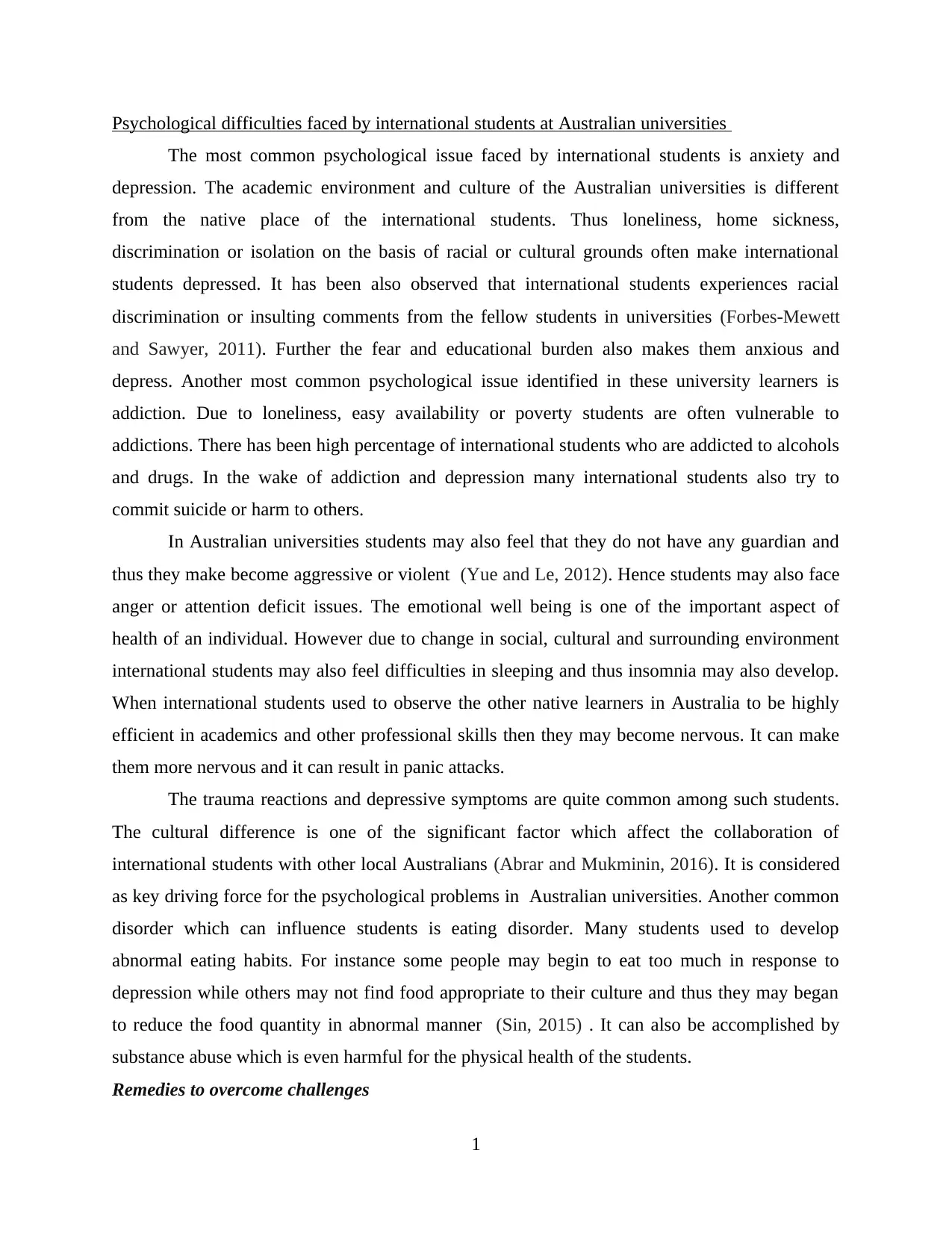
Psychological difficulties faced by international students at Australian universities
The most common psychological issue faced by international students is anxiety and
depression. The academic environment and culture of the Australian universities is different
from the native place of the international students. Thus loneliness, home sickness,
discrimination or isolation on the basis of racial or cultural grounds often make international
students depressed. It has been also observed that international students experiences racial
discrimination or insulting comments from the fellow students in universities (Forbes-Mewett
and Sawyer, 2011). Further the fear and educational burden also makes them anxious and
depress. Another most common psychological issue identified in these university learners is
addiction. Due to loneliness, easy availability or poverty students are often vulnerable to
addictions. There has been high percentage of international students who are addicted to alcohols
and drugs. In the wake of addiction and depression many international students also try to
commit suicide or harm to others.
In Australian universities students may also feel that they do not have any guardian and
thus they make become aggressive or violent (Yue and Le, 2012). Hence students may also face
anger or attention deficit issues. The emotional well being is one of the important aspect of
health of an individual. However due to change in social, cultural and surrounding environment
international students may also feel difficulties in sleeping and thus insomnia may also develop.
When international students used to observe the other native learners in Australia to be highly
efficient in academics and other professional skills then they may become nervous. It can make
them more nervous and it can result in panic attacks.
The trauma reactions and depressive symptoms are quite common among such students.
The cultural difference is one of the significant factor which affect the collaboration of
international students with other local Australians (Abrar and Mukminin, 2016). It is considered
as key driving force for the psychological problems in Australian universities. Another common
disorder which can influence students is eating disorder. Many students used to develop
abnormal eating habits. For instance some people may begin to eat too much in response to
depression while others may not find food appropriate to their culture and thus they may began
to reduce the food quantity in abnormal manner (Sin, 2015) . It can also be accomplished by
substance abuse which is even harmful for the physical health of the students.
Remedies to overcome challenges
1
The most common psychological issue faced by international students is anxiety and
depression. The academic environment and culture of the Australian universities is different
from the native place of the international students. Thus loneliness, home sickness,
discrimination or isolation on the basis of racial or cultural grounds often make international
students depressed. It has been also observed that international students experiences racial
discrimination or insulting comments from the fellow students in universities (Forbes-Mewett
and Sawyer, 2011). Further the fear and educational burden also makes them anxious and
depress. Another most common psychological issue identified in these university learners is
addiction. Due to loneliness, easy availability or poverty students are often vulnerable to
addictions. There has been high percentage of international students who are addicted to alcohols
and drugs. In the wake of addiction and depression many international students also try to
commit suicide or harm to others.
In Australian universities students may also feel that they do not have any guardian and
thus they make become aggressive or violent (Yue and Le, 2012). Hence students may also face
anger or attention deficit issues. The emotional well being is one of the important aspect of
health of an individual. However due to change in social, cultural and surrounding environment
international students may also feel difficulties in sleeping and thus insomnia may also develop.
When international students used to observe the other native learners in Australia to be highly
efficient in academics and other professional skills then they may become nervous. It can make
them more nervous and it can result in panic attacks.
The trauma reactions and depressive symptoms are quite common among such students.
The cultural difference is one of the significant factor which affect the collaboration of
international students with other local Australians (Abrar and Mukminin, 2016). It is considered
as key driving force for the psychological problems in Australian universities. Another common
disorder which can influence students is eating disorder. Many students used to develop
abnormal eating habits. For instance some people may begin to eat too much in response to
depression while others may not find food appropriate to their culture and thus they may began
to reduce the food quantity in abnormal manner (Sin, 2015) . It can also be accomplished by
substance abuse which is even harmful for the physical health of the students.
Remedies to overcome challenges
1
⊘ This is a preview!⊘
Do you want full access?
Subscribe today to unlock all pages.

Trusted by 1+ million students worldwide
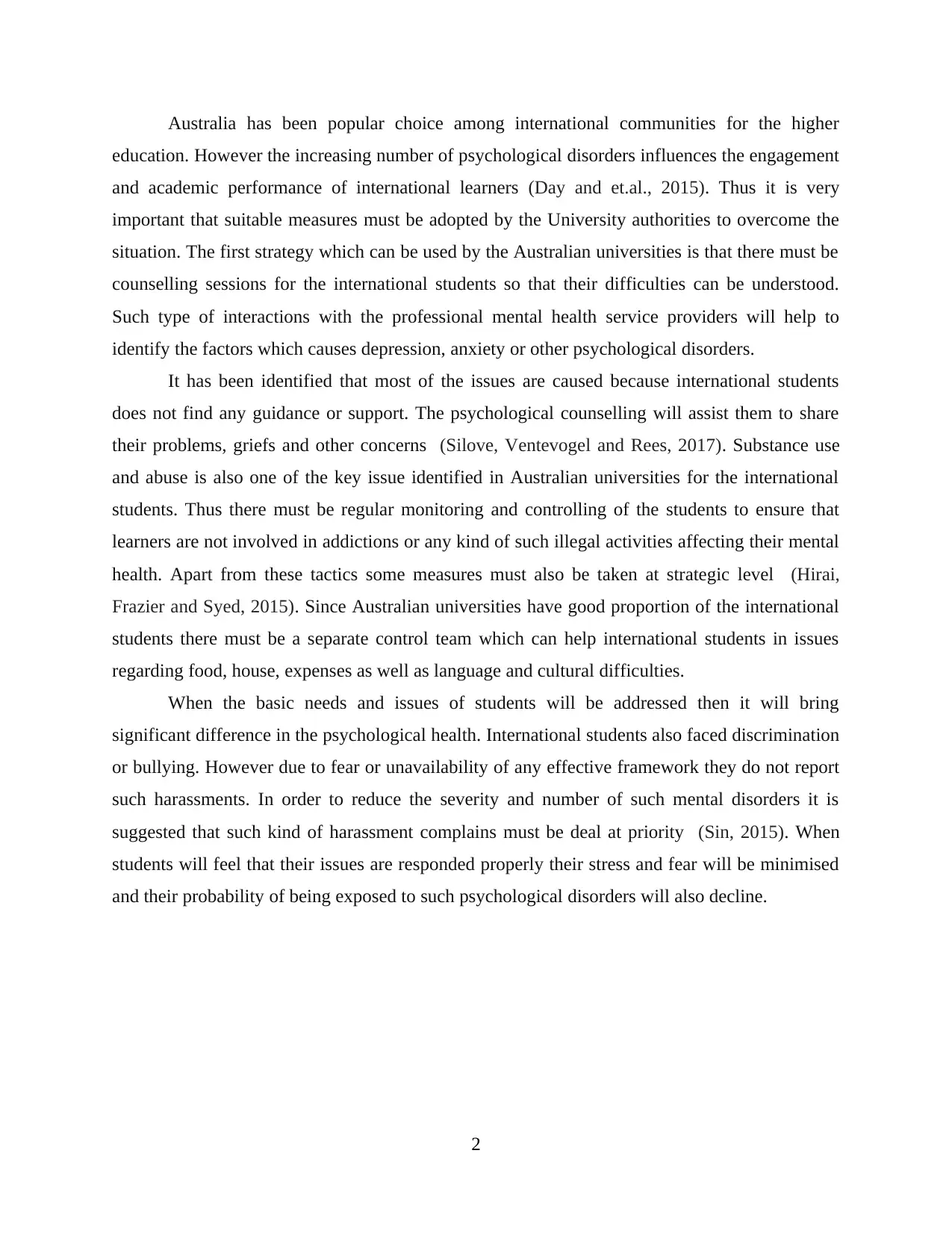
Australia has been popular choice among international communities for the higher
education. However the increasing number of psychological disorders influences the engagement
and academic performance of international learners (Day and et.al., 2015). Thus it is very
important that suitable measures must be adopted by the University authorities to overcome the
situation. The first strategy which can be used by the Australian universities is that there must be
counselling sessions for the international students so that their difficulties can be understood.
Such type of interactions with the professional mental health service providers will help to
identify the factors which causes depression, anxiety or other psychological disorders.
It has been identified that most of the issues are caused because international students
does not find any guidance or support. The psychological counselling will assist them to share
their problems, griefs and other concerns (Silove, Ventevogel and Rees, 2017). Substance use
and abuse is also one of the key issue identified in Australian universities for the international
students. Thus there must be regular monitoring and controlling of the students to ensure that
learners are not involved in addictions or any kind of such illegal activities affecting their mental
health. Apart from these tactics some measures must also be taken at strategic level (Hirai,
Frazier and Syed, 2015). Since Australian universities have good proportion of the international
students there must be a separate control team which can help international students in issues
regarding food, house, expenses as well as language and cultural difficulties.
When the basic needs and issues of students will be addressed then it will bring
significant difference in the psychological health. International students also faced discrimination
or bullying. However due to fear or unavailability of any effective framework they do not report
such harassments. In order to reduce the severity and number of such mental disorders it is
suggested that such kind of harassment complains must be deal at priority (Sin, 2015). When
students will feel that their issues are responded properly their stress and fear will be minimised
and their probability of being exposed to such psychological disorders will also decline.
2
education. However the increasing number of psychological disorders influences the engagement
and academic performance of international learners (Day and et.al., 2015). Thus it is very
important that suitable measures must be adopted by the University authorities to overcome the
situation. The first strategy which can be used by the Australian universities is that there must be
counselling sessions for the international students so that their difficulties can be understood.
Such type of interactions with the professional mental health service providers will help to
identify the factors which causes depression, anxiety or other psychological disorders.
It has been identified that most of the issues are caused because international students
does not find any guidance or support. The psychological counselling will assist them to share
their problems, griefs and other concerns (Silove, Ventevogel and Rees, 2017). Substance use
and abuse is also one of the key issue identified in Australian universities for the international
students. Thus there must be regular monitoring and controlling of the students to ensure that
learners are not involved in addictions or any kind of such illegal activities affecting their mental
health. Apart from these tactics some measures must also be taken at strategic level (Hirai,
Frazier and Syed, 2015). Since Australian universities have good proportion of the international
students there must be a separate control team which can help international students in issues
regarding food, house, expenses as well as language and cultural difficulties.
When the basic needs and issues of students will be addressed then it will bring
significant difference in the psychological health. International students also faced discrimination
or bullying. However due to fear or unavailability of any effective framework they do not report
such harassments. In order to reduce the severity and number of such mental disorders it is
suggested that such kind of harassment complains must be deal at priority (Sin, 2015). When
students will feel that their issues are responded properly their stress and fear will be minimised
and their probability of being exposed to such psychological disorders will also decline.
2
Paraphrase This Document
Need a fresh take? Get an instant paraphrase of this document with our AI Paraphraser
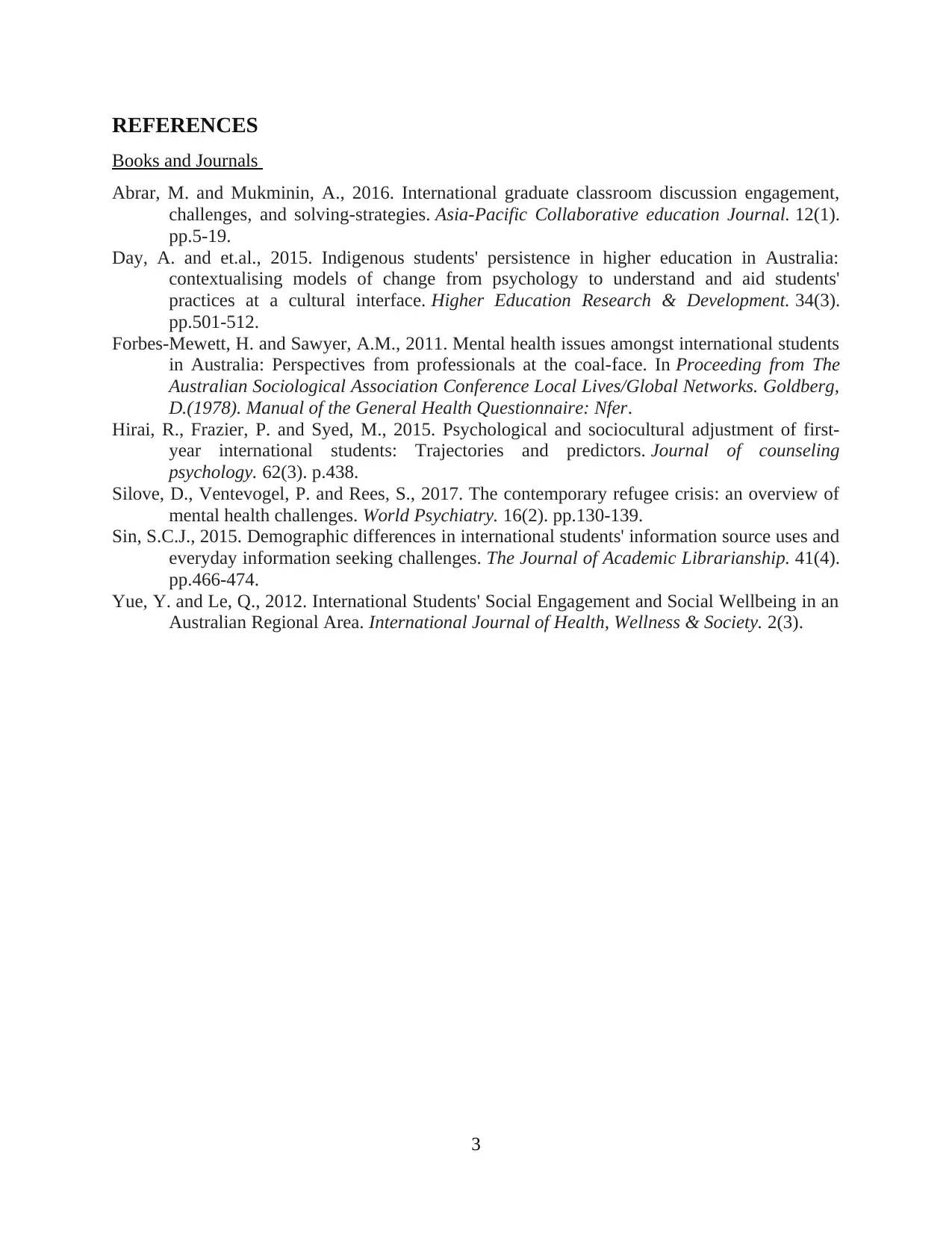
REFERENCES
Books and Journals
Abrar, M. and Mukminin, A., 2016. International graduate classroom discussion engagement,
challenges, and solving-strategies. Asia-Pacific Collaborative education Journal. 12(1).
pp.5-19.
Day, A. and et.al., 2015. Indigenous students' persistence in higher education in Australia:
contextualising models of change from psychology to understand and aid students'
practices at a cultural interface. Higher Education Research & Development. 34(3).
pp.501-512.
Forbes-Mewett, H. and Sawyer, A.M., 2011. Mental health issues amongst international students
in Australia: Perspectives from professionals at the coal-face. In Proceeding from The
Australian Sociological Association Conference Local Lives/Global Networks. Goldberg,
D.(1978). Manual of the General Health Questionnaire: Nfer.
Hirai, R., Frazier, P. and Syed, M., 2015. Psychological and sociocultural adjustment of first-
year international students: Trajectories and predictors. Journal of counseling
psychology. 62(3). p.438.
Silove, D., Ventevogel, P. and Rees, S., 2017. The contemporary refugee crisis: an overview of
mental health challenges. World Psychiatry. 16(2). pp.130-139.
Sin, S.C.J., 2015. Demographic differences in international students' information source uses and
everyday information seeking challenges. The Journal of Academic Librarianship. 41(4).
pp.466-474.
Yue, Y. and Le, Q., 2012. International Students' Social Engagement and Social Wellbeing in an
Australian Regional Area. International Journal of Health, Wellness & Society. 2(3).
3
Books and Journals
Abrar, M. and Mukminin, A., 2016. International graduate classroom discussion engagement,
challenges, and solving-strategies. Asia-Pacific Collaborative education Journal. 12(1).
pp.5-19.
Day, A. and et.al., 2015. Indigenous students' persistence in higher education in Australia:
contextualising models of change from psychology to understand and aid students'
practices at a cultural interface. Higher Education Research & Development. 34(3).
pp.501-512.
Forbes-Mewett, H. and Sawyer, A.M., 2011. Mental health issues amongst international students
in Australia: Perspectives from professionals at the coal-face. In Proceeding from The
Australian Sociological Association Conference Local Lives/Global Networks. Goldberg,
D.(1978). Manual of the General Health Questionnaire: Nfer.
Hirai, R., Frazier, P. and Syed, M., 2015. Psychological and sociocultural adjustment of first-
year international students: Trajectories and predictors. Journal of counseling
psychology. 62(3). p.438.
Silove, D., Ventevogel, P. and Rees, S., 2017. The contemporary refugee crisis: an overview of
mental health challenges. World Psychiatry. 16(2). pp.130-139.
Sin, S.C.J., 2015. Demographic differences in international students' information source uses and
everyday information seeking challenges. The Journal of Academic Librarianship. 41(4).
pp.466-474.
Yue, Y. and Le, Q., 2012. International Students' Social Engagement and Social Wellbeing in an
Australian Regional Area. International Journal of Health, Wellness & Society. 2(3).
3
1 out of 5
Related Documents
Your All-in-One AI-Powered Toolkit for Academic Success.
+13062052269
info@desklib.com
Available 24*7 on WhatsApp / Email
![[object Object]](/_next/static/media/star-bottom.7253800d.svg)
Unlock your academic potential
Copyright © 2020–2026 A2Z Services. All Rights Reserved. Developed and managed by ZUCOL.





